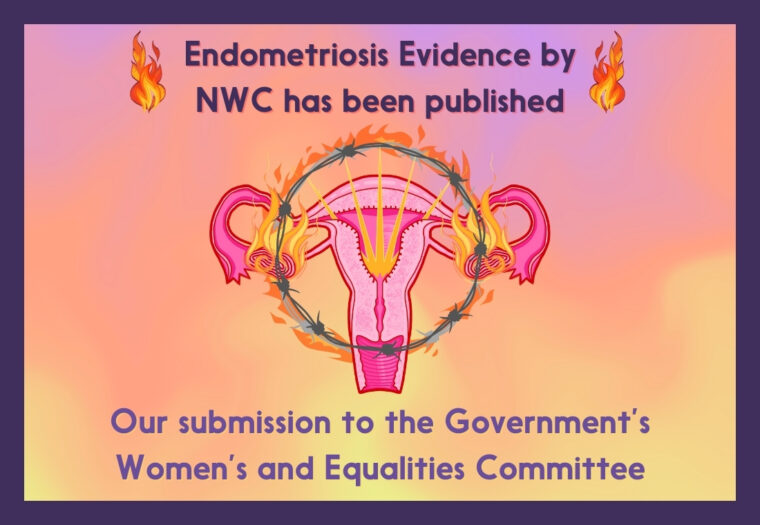1 in 10 (1.5 million) people suffer from endometriosis in the UK. In Nottingham this accounts for around 30,000 people. It currently takes an average of eight years to be diagnosed.

What’s the story in Nottingham?
Nottingham Women’s Centre’s staff, network and service users are suffering due to the lack of a specialist NHS endometriosis clinic in Nottingham.
The absence of a specialist NHS endometriosis clinic has resulted in arduous extended travel for those with chronic pain and limited mobility; plus steep financial burdens of increased transport and childcare costs for those who are often also on low wages, or have limited means to afford these costs.
People are being forced to travel to Leicester, Peterborough, Birmingham, and other parts of the country for treatment. This is particularly difficult for those with caring responsibilities and those who don’t have cars.
The lack of appropriate and timely treatment for endometriosis can have a serious impact on people’s mental health and has been linked to painkiller addiction. 90% of the people we polled who live with endometriosis said they would have liked psychological support, but they had not been offered this as part of their treatment.
We ran a poll through our social media platforms and found that 45% of respondents with endometriosis said they had to travel to other parts of the country for treatment. It was unanimously agreed that it was “extremely important” that Nottingham gets a specialist endometriosis treatment centre.
Because I have severe endometriosis, I have to be treated by a specialist endometriosis centre, however Nottingham does not have such a centre so I need to travel to Leicester for my care. This is also where my surgery will take place meaning it is unlikely that any friends or family will be able to visit me while I’m in hospital.”
What has NWC done?
- We’ve engaged with: NHS Trust Nottingham, Nottinghamshire Integrated Care Board, Endometriosis UK, specialist doctors and nurses, Nottingham Keep Our NHS Public, people with lived experiences, and research groups at the University of Nottingham and University of Leicester.
- We submitted a proposal for change on endometriosis to feed into the Nottinghamshire ICS Strategy.
- In March 2023, we led an endometriosis awareness campaign on our social media channels with useful tips about endometriosis as well as promoting an online event with healthcare professionals.
- We hosted this ‘All About Endometriosis’ online workshop in May 2023 with Dr Deb Shilpa (Consultant Gynaecologist) and Sanya Kurmani from NHS Nottingham. They answered questions on: symptom, diagnosis, treatment option and where and how to access support for anyone with suspected and/or confirmed endometriosis within the Nottingham. This workshop was really impactful with many local people in attendance.
Here’s our evidence on Endometriosis in Nottingham, submitted to the Government’s Women’s and Equalities Committee:

In August 2023, NWC submitted an evidence in response to the inquiry by the Government’s Women and Equalities Committee on women’s reproductive health. This evidence was accepted by the Committee and is now published on the UK Parliament website!
In our submission, the team specifically gathered evidence to answer the following two questions:
1. What are women’s experiences of being diagnosed, undergoing procedures, and being treated for gynaecological and/or urogynaecological conditions?
- First hand accounts describe the experience of receiving medical advice on endometriosis as inconsistent, piecemeal, contradictory, inaccessible, and limited.
- Women have not been given accurate and comprehensive information from GPs and health care professionals.
- We have found NO gynaecologists with specialist training in endometriosis in Nottingham.
- It takes sufferers over 8 years to get a diagnosis.
- First hand accounts indicate that symptoms start around age 14, with chronic pain and fatigue disrupting education, and then employment.
- Prolonged delays in diagnosis and treatment extends women’s experiences of chronic pain, risk of disability, reduced quality of life and difficulties with relationships and family.
- There is a lack of psychological support for women experiencing excruciating chronic pain. Intense first hand reports of the suffering include descriptions such as:
Due to this unmanageable pain and a lack of support, women are becoming addicted to strong painkillers, creating more negative impacts on their mental and physical health.
2. What barriers exist to the diagnosis and treatment of gynaecological and/or urogynaecological conditions?
- The absence of a specialist NHS endometriosis clinic in Nottingham means women are forced to travel to Leicester, Peterborough, Birmingham, and further parts of the country for essential treatment.
- Extended travel is incredibly difficult for those with chronic pain and limited mobility.
- Unaffordable financial burdens of increased transport, accommodation and childcare costs are also experienced by sufferers who are often also on low wages, or have limited means to afford these costs, and are also experiencing other severe multiple disadvantages.
- These burdens make health care inaccessible for sufferers, and further intensifies health inequalities.
- Waiting times for a first consultation after referral to a specialist treatment centre are over 6 months long.
- During these long waiting times, women continue to suffer with persistent symptoms such as excessive bleeding and chronic pain that incapacitates their ability to live their normal lives.
- Long waiting times and delayed appointments lead to delayed referral and diagnosis.
- This in turn leads to serious long term implications for sufferers, such as endometriosis-related disabilities, and deep trauma issues, which would have been avoidable had treatment occurred sooner.
In conclusion, the evidence gathered highlights six key action points for the Government to tackle these current barriers to women’s reproductive health in Nottingham:
- Funding allocation for a specialist endometriosis clinic in to serve ~16,000 women who suffer with endometriosis in Nottingham.
- Ensuring specialist NHS endometriosis treatment centres have sufficient capacity to treat and care for all the women referred to them, regardless of where they live. Different ICS areas must work together to ensure that these needs can be met.
- Provision of free psychological support within the NHS for women suffering from endometriosis.
- Better training and education about endometriosis diagnosis for Nottingham’s GP practices.
- Launch of a wider awareness campaign on endometriosis, to limit suffering and encourage women to get diagnosed, and improve public and workplace understanding of the condition.
- Funding of research on the condition, and diagnosis education for better health outcomes.

What support is there?
Nottingham has it’s own endometriosis support group – an informal space to share stories and experiences without judgments and learn more from other people in your situation. Endometriosis UK also have lots of support and information.
What now?
We’re several steps away from achieving our goal of there being a specialist endometriosis clinic in Nottingham and have met some challenges, we want to see people experiencing this condition have access to the services they need. If you know how to make that happen, get in touch.
